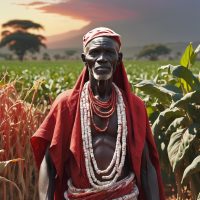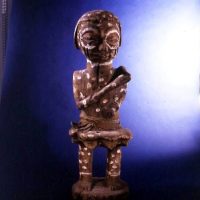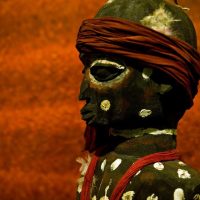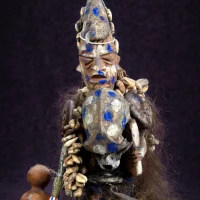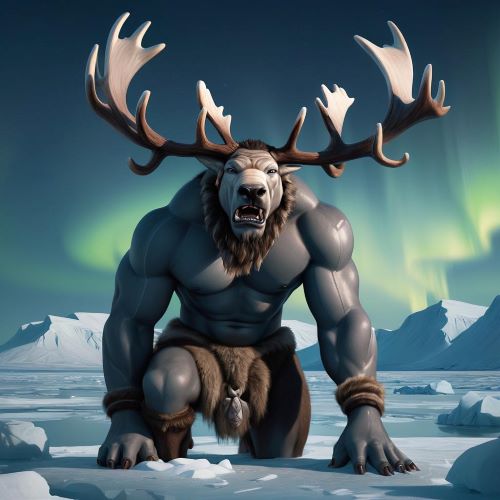Pinga : Goddess of the Hunt
Listen
At a glance
| Description | |
|---|---|
| Origin | Inuit Mythology |
| Classification | Gods |
| Family Members | N/A |
| Region | Greenland, Alaska, Canada |
| Associated With | Hunting, Fertility |
Pinga
Introduction
Pinga, a revered deity in Inuit mythology, holds a prominent place as the Goddess of the Hunt and Fertility. Her role is integral to Inuit culture, where she is invoked for successful hunts and blessings related to fertility and motherhood. Pinga’s name, meaning “the one who is up on high,” reflects her celestial nature and lofty status among the Inuit deities.
This multifaceted goddess also governs medicine, symbolizing the delicate balance between life and death in the harsh Arctic environment. Pinga’s presence is deeply woven into the fabric of Inuit mythology, embodying a range of attributes that highlight her importance. Described as both a goddess and a spirit, she is central to numerous tales and traditions, underscoring her profound significance within the culture.
Physical Traits
Inuit myths offer little description of Pinga’s physical form, focusing more on her actions and influence. Unlike deities with elaborate details, Pinga remains an enigma. However, her connection to the sky hints at a celestial being. Imagine her adorned with the aurora borealis, an ethereal figure cloaked in the vastness of the night sky. Alternatively, some interpretations portray her as a benevolent woman radiating warmth, a stark contrast to the harsh environment she governs. Depictions vary across regions, reflecting diverse interpretations. Some envision a radiant figure symbolizing fertility and abundance, while others see a powerful yet ethereal presence, akin to the dancing Northern Lights. Interestingly, some stories associate Pinga with the moon, her luminous form bathing the icy landscape in a gentle glow.
Family
In Inuit mythology, Pinga’s familial relationships are not clearly defined. Interpretations vary across communities, with some viewing her as similar to or the same as Sila, the supreme sky god, while others differentiate between the two. Some scholars suggest that Pinga might represent the feminine principle within the cosmic order, possibly as a consort or aspect of Sila. Others propose a link to Sedna, the sea goddess, with Pinga presiding over the world above and Sedna ruling the depths below. The fluid nature of the Inuit belief system allows for diverse interpretations, leaving Pinga’s exact familial ties open to discussion. Despite the ambiguity, Pinga is recognized as a significant deity in the Inuit pantheon, often depicted as a nurturing figure bridging the celestial and earthly realms. Her perceived role as Sila’s daughter and Nunam’s, the earth goddess, underscores her importance in Inuit culture.
Other names
Pinga is primarily recognized by her name, which means “the one who is up on high.” However, she is also known by different names in various Inuit communities, reflecting regional interpretations and specific cultural nuances. In areas where caribou hunting is prevalent, she may be called Qailertuugaq, meaning “She Who Gives Caribou,” underscoring her role in ensuring the well-being of these crucial animals. Some communities may also associate her with Pana, the guardian of souls, highlighting overlapping attributes between these figures.
These variations illustrate the complex and multifaceted nature of Pinga within Inuit mythology. Her different names, such as Pana and Pilliluk, emphasize the rich diversity of beliefs and traditions surrounding her character across the Arctic regions. This regional diversity showcases the broad cultural significance of Pinga, reinforcing her vital role in the spiritual and daily lives of the Inuit people.
Powers and Abilities
Pinga, a multifaceted deity in Inuit mythology, commands a diverse array of powers and responsibilities. Revered as the Goddess of the Hunt and Fertility, she holds sway over critical aspects of Inuit life, ensuring the sustenance and well-being of her people. With her association with hunting, healing, and guiding souls to the afterlife, Pinga embodies the delicate balance between life and death in the harsh Arctic environment. Shamans, known as Angakkuit, often commune with Pinga or receive messages from her, seeking her guidance and wisdom in matters of the spiritual and the mundane.
In Caribou Inuit communities, Pinga’s authority extends over caribou herds, reflecting her role in maintaining ecological balance and sustainability. She vigilantly oversees hunting practices, becoming displeased if humans take more than necessary, thus emphasizing her role as a protector of animal populations. This guardianship underscores the Inuit reverence for the natural world and their understanding of the interconnectedness between humans and the environment they inhabit.
Pinga’s influence transcends the realm of the physical, encompassing healing and spiritual guidance. As a source of knowledge for medicinal herbs and natural remedies, she aids shamans in their quest to cure illnesses and injuries, showcasing her nurturing and protective qualities. Additionally, Pinga serves as a psychopomp, guiding the souls of the deceased to Adlivun, where they await potential reincarnation. Through her multifaceted powers, Pinga remains a central figure in Inuit mythology, embodying the cyclical nature of life and the profound interconnectedness between humanity and the natural world.
Modern Day Influence
Pinga’s enduring influence extends into contemporary times, notably within Inuit communities where her role in maintaining hunting practices and conservation remains pivotal. Revered as a goddess of fertility, health, and community well-being, Pinga’s impact resonates in the values and traditions upheld by the Inuit today. Her representation in various forms of artistic expression continues to underscore her significance within Inuit culture. Despite shifts in the traditional way of life, Pinga’s legacy persists, with artists reimagining her image in paintings, sculptures, and even comics, serving as a poignant reminder of the importance of environmental stewardship and sustainable practices.
Beyond her cultural significance, Pinga’s multifaceted nature holds relevance in contemporary discussions of gender and spirituality. Unlike some patriarchal deities prevalent in other mythologies, Pinga symbolizes a potent feminine force governing vital aspects of life, resonating with feminist scholars and theologians as a beacon of female empowerment and divine femininity. As Inuit beliefs and practices evolve, Pinga’s subtle yet enduring influence endures, reflected in various facets of modern Inuit culture, from artistic expressions to ceremonial rituals and spiritual beliefs. In honoring Pinga, Inuit communities reaffirm their profound connection with the natural world and express gratitude for her ongoing blessings and guidance during ceremonies marking the changing seasons.
Related Images
Frequently Asked Questions
What is lorem Ipsum?
I am text block. Click edit button to change this text. Lorem ipsum dolor sit amet, consectetur adipiscing elit. Ut elit tellus, luctus nec ullamcorper mattis, pulvinar dapibus leo.
What is lorem Ipsum?
I am text block. Click edit button to change this text. Lorem ipsum dolor sit amet, consectetur adipiscing elit. Ut elit tellus, luctus nec ullamcorper mattis, pulvinar dapibus leo.
What is lorem Ipsum?
I am text block. Click edit button to change this text. Lorem ipsum dolor sit amet, consectetur adipiscing elit. Ut elit tellus, luctus nec ullamcorper mattis, pulvinar dapibus leo.
What is lorem Ipsum?
I am text block. Click edit button to change this text. Lorem ipsum dolor sit amet, consectetur adipiscing elit. Ut elit tellus, luctus nec ullamcorper mattis, pulvinar dapibus leo.
What is lorem Ipsum?
I am text block. Click edit button to change this text. Lorem ipsum dolor sit amet, consectetur adipiscing elit. Ut elit tellus, luctus nec ullamcorper mattis, pulvinar dapibus leo.

